- Home
- Piers Anthony
Cluster c-1 Page 3
Cluster c-1 Read online
Page 3
Flint burst out laughing. The Shaman seldom made jokes, but when he did, they were beauties! “Cavemen and dinosaurs! It’s an error to put them together, all right!”
The Shaman sighed. “I keep forgetting…” Then he sat up, startled. “Sol? Are you sure? Sol has been obscured?”
“Sol. I see Toliman—”
“An omen! An omen! Clear as the star itself!”
Flint put down the telescope. “Do you really believe in such?”
“On Earth, thirty years ago—I mean, two hundred and thirty years ago—no. I wasn’t superstitious. But here on Outworld, in the Old Stone Age, the people expect it from me. After a while it becomes easier to accept. And I must admit, for those who follow omens, this is as clear as they come. Sol is going to change your life—significantly. And soon. Take it from an old scientist who converted to a medicine doctor to survive among savages: you have been warned by the stars.”
“No!” Flint said. “Sol is nothing to me, and I don’t believe that rubbish.” But he felt a premonitory chill, for despite his denials, he did believe.
“Flint! Flint!” the child cried. “The hunt—you must come!”
Flint stopped in the path, letting the lad come to him. It was a messenger runner. “I’m not involved in hunting anymore; you know that. I’m the stonemason.” He did not need to add that he was also apprenticed to the crazy Shaman.
“Three are dead, five gored, two trampled. We need help!”
“Three dead! That was supposed to be a routine morning hunt! What did they flush?”
“Old Snort,” the boy cried despairingly.
“No wonder! That dinosaur is best left alone. Anyone fool enough to tangle with him—”
“Chief Strongspear—”
“That explains it!” But Flint was on nervous ground, for if word of his insolence reached the Chief there could be unpleasant repercussions.
“Chief Strongspear’s son is dying. Old Snort won’t let them recover the dead. You must come.”
“I told you—I no longer hunt!” But he wondered. The Shaman had spoken of leadership, and now the Chief’s son was dying. The heir was stupid, like the father—but who would fill that office if the muscular Chiefson died? In a year the Chief would be retired. And Sol had been eclipsed. Since Flint had seen it happen, he was the one directly affected by the omen.
“Chief Strongspear says if you don’t come now, he’ll put a pus-spell on Honeybloom.”
The Chief was fighting dirty! The very thought of such disfiguration on the prettiest girl in the tribe turned Flint’s stomach. “I’ll come. Show the way.”
The boy showed the way, running swiftly ahead. These runners were agile and long-winded; they could keep the pace better than any man. Flint followed, pausing only to don his harness and secure his best handax. They left the fruitpalms of the oasis behind, hopped from hummock to hummock through the thornreed swamp—the village’s chief bulwark against predatory dinosaurs—and climbed nimbly up the trailing tentacle of a vine. At first it was only a few inches in diameter, requiring careful balancing, but as they approached the vine’s center web it swelled to more than a yard across.
Out along the opposite tentacle they went, dropping to the firm ground beyond the swamp. They passed a bed of fragrant honeyblooms, the big green-and-red flowers as pretty as they smelled, reminding him poignantly of their namesake: his woman. He and Honeybloom would be wed in midsummer. He would go to her tonight…
The boy slowed. An alien was squatting in the path. A Polarian.
They drew up before the strange creature. It was a teardrop-shaped thing with a massive spherical wheel on the bottom and a limber tentacle or trunk at the top. When that tentacle reached straight up, it would be as high as Flint, and the body’s mass was similar to his. But the Polarian had no eyes, ears, nose, or other appendages.
The Shaman claimed they were similar to human beings because they liked similar gravity, breathed the same air—though they had no lungs—and had a similar body chemistry. Their brains were as massive and versatile as man’s, and they were normally inoffensive. But they looked quite different, and such details as how they ate, reproduced, and eliminated were mysteries.
But Flint had promised himself to treat the next alien he met with special courtesy. He and the boy halted politely. “Greetings, explorer,” Flint said.
The creature’s body glowed with simulated pleasure. It put its stalk down to the ground. In this position it looked more than ever like a dinosaur dropping. Flint stifled a laugh.
A little ball in the tip of the trunk spun rapidly. “Greetings, native,” the ground said.
Flint was not surprised. He had been familiar with the mechanism from infancy. The little ball vibrated against the ground—or any available surface—to produce intelligible sounds. As the Polarian had no mouth, it could not talk as humans did.
“I am Flint, Solarian male.” What was obvious to a human was not necessarily evident to a Polarian—and vice versa. Protocol did not require such an introduction; he could have gone on after the first exchange. The runner boy was already fidgeting at this delay. But Flint had a resolution to fulfill: appreciate an alien.
“Tsopi, Polarian female.”
“Peace, Topsy.”
“Peace, Plint.”
Was this creature laughing back at him? What did the human form resemble, to the alien perception? A bundle of vine splinters? Flint became intrigued. “I go to a dinosaur hunt. Would you like to accompany me?” In one sense, this too was protocol; Polarians liked to be included in activities. But they were appropriately wary of dinosaurs.
“I would be gratified,” the teardrop said.
Now he had done it! He had never suspected the creature would accept! Well, it couldn’t be helped. “It is an emergency. We shall be hurrying.”
“I shall not impede you,” the Polarian replied.
Fat chance! But Flint smiled graciously. He gestured to the boy. “Show the way.”
The runner was off, sensing a race. This was firm, level ground, excellent for making time. Flint followed, stretching his legs.
But Tsopi followed right along, rolling smoothly on her ball-wheel. She was at no disadvantage. Polarians could move rapidly and effortlessly when the terrain was right; their wheel was efficient. Flint had not before appreciated how efficient. On occasion he had wondered how the aliens kept themselves upright. The Shaman had remarked that a man on a unicycle performed the same feat. But there were no unicycles on Outworld.
Then they came to a ravine. One vine crossed it. The boy leaped up, caught a trailing sprout, and hauled himself topside. Flint started to follow, then paused. The Polarian could never make that leap.
“Permit me,” Flint said, extending his linked hands. He had heard of this kind of cooperation, and was curious to see if it worked.
The Polarian looped her trunk around the hands. It was warm; the body temperature was similar to man’s. Flint braced himself and heaved up, hauling the entire weight of almost two hundred pounds into the air. Then he swung—and the torso of the creature bumped against the underside of the vine.
Instantly the trunk disengaged from his hands and whipped about the vine. The bottom wheel spun against the bark, shoving the torso up. The entire body elongated momentarily; the aliens had no bones. In a moment, by a splendid feat of acrobatics, the Polarian stood upright atop the vine, ready to move on.
Flint hauled himself up, and they proceeded, running single file across the chasm. Purple mud bubbled far below; trash was disposed of here, for what dropped into that mud never reappeared.
The vine trailed near the ground on the far side, so the Polarian needed no help. Actually, Flint realized, she could have used a small ramp to hurl herself a few feet into the air at speed, high enough to catch the vine with her upraised tentacle. His assistance had merely facilitated things.
A mile farther along Flint heard the noises of an enraged dinosaur. “Trouble, all right!” he gasped, and tried to
run faster. But he was winded.
Tsopi rolled up beside him, effortlessly. The tentacle touched the ground. “Permit me,” she said. Then the trunk reached over, circled around Flint’s waist, and tightened elastically. In a moment he was lifted into the air, head forward.
Then Tsopi accelerated. Faster than any man, she zoomed across the plain, carrying Flint like an elevated javelin. Thirty miles an hour, thirty-five, forty—the wind whistled past his ears and forced his eyes and mouth closed. No wonder the Polarians had no such organs; they were unusable at this velocity. He held himself perfectly rigid, knowing that any upset in the alien’s balance would be disastrous.
In moments they were at the scene of action. Tsopi slowed and set him down. The runner was far behind.
“Thanks, Topsy,” Flint muttered, not entirely pleased at this demonstration of the alien’s superior ability. But he realized that the Polarian might have felt similarly about the climb to the vine. It was a lesson, and a good one, vindicating the comment of the Shaman—yet it galled him that he should have had to learn it this way.
“Welcome, Plint,” the Polarian responded, making a momentary glow of amusement.
Flint turned his attention to the situation. It was a disaster, all right. Two bodies lay in the trampled dirt, and Old Snort paced angrily around them. He had already worn a brown track in the turf. He didn’t want to eat the bodies, for he was herbivorous, but he was intent on killing any other men who approached. Some ancient instinct told him that eventually they were sure to approach their dead.
The dinosaur was old, but neither small nor feeble. He measured thirty feet from snout to tail, and weighed about fifteen tons. His long-range eyesight was poor, but his nose and ears more than made up for this deficiency, and his muscles were huge. He had been wounded by several spear thrusts, but the cuts were superficial and only increased his rage. This hunt had been botched, all right!
“Where is the Chief?” Flint demanded of the nearest warrior, who was cowering behind the stump of a withered vine.
“Wounded,” the man cried. “He watches over his son, who is dying. He calls for you.”
Flint hesitated, remembering the eclipse of Sol. The omen could signify the direct intervention of Sol in his affairs, but an alternate interpretation was that he could face a crisis of leadership. Sol was literally the center of the human empire, but figuratively the symbol of power, anywhere. If he bailed out Chief Strongspear, in the absence of the Chief’s natural son, Flint would become the odds-on favorite for adoptive replacement. The Chief was too old to sire a new son, and too near retirement to raise a young lad to the office. But he had to have an heir, and soon. The custom of the tribe required it.
Flint wasn’t certain he wanted leadership. There were many strictures on the Chief. He had to officiate at all sacrifices, marry all widows, lead all major hunts, and settle all tribal disputes. Any of these could be sticky matters. It was a dangerous, unpopular office, with little occasion for romance or star-gazing. Worst of all, the Chief had to practice magic, to ensure good hunts and fertile tribes-women, and to compel discipline. Just as Strongspear had compelled Flint’s own attendance by the threat of the pus-spell.
Flint did not believe in magic—at least, not for himself. Others could cast spells that worked beautifully, but Flint had never been able to succeed. The Shaman had told him it was a matter of confidence and suggestion, that the spells worked because the ignorant tribesmen really believed in them. And the Shaman had demonstrated this by casting a mass sleep-spell on the entire tribe in the middle of the day. All had either succumbed or pretended to. Flint himself had gone under. The Shaman, figure of ridicule that he might be, knew human nature well, and was the ultimate magician. But Flint’s own efforts didn’t compel sufficient belief, and so failed. Already the others well knew his liability; men Flint could back off in a physical encounter could back him off in magical competition. It didn’t help to have the Shaman explain that their very strength came from their ignorance; the plain fact was their magic worked.
Even Honeybloom had once given him a stiff finger, mischievously. He had been forced to gather three five-leaved thornblooms, at terrible expense to his hide, before she relented and put them in her red hair. “Intelligent people are highly suggestible,” the Shaman had observed, unperturbed.
And there was one crowning drawback to the Chief-ship: retirement. At the end of his term, the Chief was ritually slaughtered and offered up for sacrifice to the Nature Spirits of Outworld. The Shaman, knowledgeable in everything, had explained that though in one sense this represented an unfortunate primitivism, in another it was practical. No Chief had any incentive to store private wealth, and so he was generally honest. “And the hunting does seem to improve the year after such a sacrifice,” the Shaman had admitted.
Naturally, Flint thought. Because the hunters had the fear of extinction goosing them, after witnessing human murder.
No, Flint did not want to be Chief! But as he came into the presence of Strongspear, he realized that he would probably have little choice. The old man’s eyes glittered with grief under his ornate headdress of rank. Blood dripped from a shoulder wound. He was in no mood to be balked. Any trouble from Flint, and there would be much worse than pus-spells as punishment.
Yet the very seriousness of the situation provoked an antisurvival mirth. Here were cavemen and dinosaurs together! Flint bit his tongue to stop the smile, but it burst out anyway.
“What the hell you laughing at, boy?” Strongspear demanded.
“Not a laugh—a grimace,” Flint said quickly. He bared his teeth to amplify his horror—and his horror was real, in its fashion. What a place for a foolish smile!
“What’s that Pole doing here?” the Chief rapped.
Flint had forgotten the Polarian, who had unobtrusively followed him. “This is Topsy of Polaris,” he said hastily. “Topsy, this is Chief Strongspear.” He faced the Chief again. “Topsy is merely observing.”
“Well, let him spin his wheel out of here!” Strongspear snapped. “We don’t need any damned aliens—”
“The Chief means it might be dangerous for you,” Flint told the Polarian. “No offense intended.” It did not seem to be the time to advise Strongspear that he had mistaken the sex of the alien.
The tentacle touched the trunk of a vine. “I quite understand, and appreciate the consideration. But the dinosaur poses no threat to me. Perhaps I can be of help.”
“Perhaps,” Flint agreed politely. He wished Tsopi would get well clear, but she was slow at taking such hints. Already he was regretting his vow to the Shaman to be nice to the aliens. If Tsopi died in the midst of a human dinosaur hunt, there could be Spherical repercussions.
“The Polarians control a Sphere twice the diameter of ours,” the Shaman had explained. “They’ve been in space longer, and they have better organization. And no doubt they’re more advanced technologically in their origin-world than we are at Earth. Out here at the Fringe they’re primitives, just as we are—just as every species is at the edge of its Sphere. But don’t let that fool you. Someday we may need their help. Always remember that.”
This was one of a great many fundamental lessons the Shaman had taught Flint: the respect of alien culture. There were few Polarians on Outworld—but there were billions within their own Sphere. In many respects, Outworld was closer to Polaris than to Sol.
Suddenly Flint had an idea. If the Polarian could be made to seem instrumental in relieving this crisis, there would be little credit due Flint himself, and thus no question of becoming heir to the Chief. Strongspear would never confer honor on an alien!
“Your offer of assistance is much appreciated,” Flint said to Tsopi. “I noticed you move very swiftly. Do you think you could lead Old Snort toward our deadfall, without running the risk of getting trampled or gored?”
“This would be simple,” Tsopi said, glowing with pleasure. Flint wondered whether her constant illumination was a Polarian trait or a female one.
“Get that dino turd out of here!” Strongspear yelled, furious that the alien should witness the human predicament.
“We shall clean up Snort’s refuse as soon as we get him in the trap,” Flint said, hoping that the Polarian would misinterpret Strongspear’s reference. If only it weren’t so apt!
They moved out. Flint showed Tsopi where the deadfall was, then they rounded up the scattered tribesmen and approached the dinosaur.
“The idea is to lure him away from our dead,” Flint explained. “But since he has killed men, he must be killed, not just removed. So we have to lead or drive him over the deadfall. The only problem is—”
“He can outrun us!” a tribesman finished.
“Yes,” Flint agreed grimly. “Therefore the Polarian has kindly agreed to take the lead. Old Snort can’t outrun a Polarian on level ground.”
The men looked dubious, but acceded to Flint’s evident authority. If he muffed it, he would be in trouble, not they. They formed a half-circle around the dinosaur, a wide arc, for they were not eager to provoke him into another devastating charge. The monster would tend to shy away from a large group of men at a distance, unable to see or smell them well enough to attack them with confidence. But this was still chancy.
Flint and Tsopi came near. Old Snort snorted as he became aware of them. He stomped the ground, making it shudder. From up close, he was huge—twice the height of a man. The bones of his head opened out into a massive shield about the neck, and he had three great horns on his nose. “A triceratops,” the Shaman had said. “Not a true reptile, here on Outworld, but close enough for practical purposes. The planet permits larger development. Convergent evolution…” Flint hadn’t cared about the technicalities; all he knew was that Old Snort was about as formidable an opponent as the planet offered. True, there were also predator dinosaurs, but they seldom bothered to go after anything as small as men, and men stayed well clear of them, so there was little contact. There were many of these hornbeasts, in contrast, and their young made good hunting. The sheer stupidity of flushing this one, instead of smaller prey…

 Serial
Serial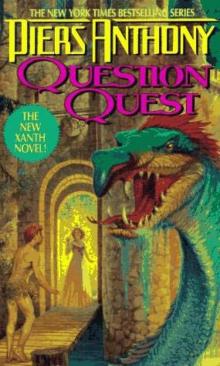 Question Quest
Question Quest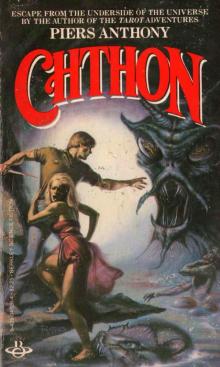 Chthon
Chthon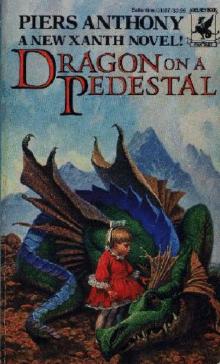 Dragon on a Pedestal
Dragon on a Pedestal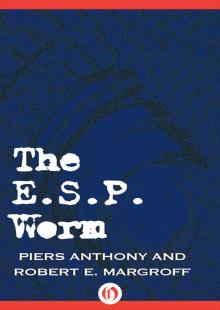 E. S. P. Worm
E. S. P. Worm Hope of Earth
Hope of Earth The Series Boxed Set
The Series Boxed Set Blue Adept
Blue Adept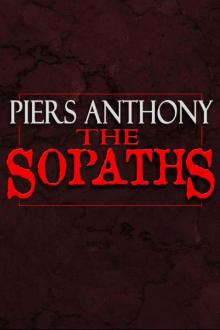 The Sopaths
The Sopaths Beetle Juice
Beetle Juice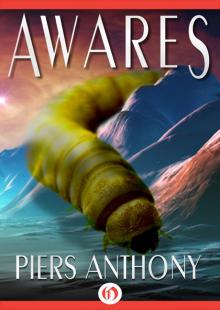 Awares
Awares Golem in the Gears
Golem in the Gears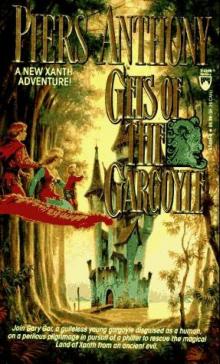 Geis of the Gargoyle
Geis of the Gargoyle Bamboo Bloodbath and Ninja's Revenge
Bamboo Bloodbath and Ninja's Revenge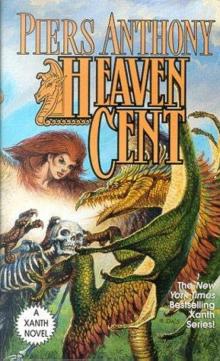 Heaven Cent
Heaven Cent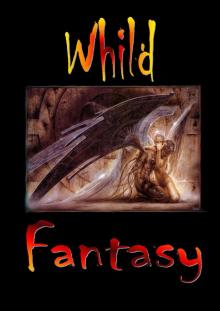 Neq the Sword
Neq the Sword Pandora Park
Pandora Park Juxtaposition
Juxtaposition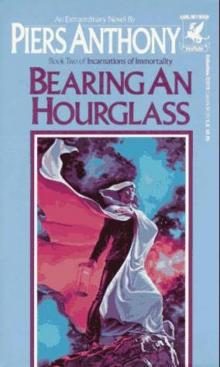 Bearing an Hourglass
Bearing an Hourglass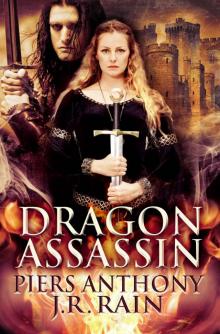 Dragon Assassin
Dragon Assassin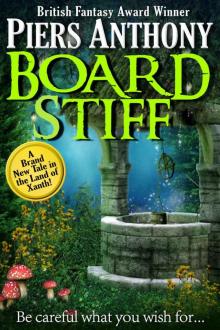 Board Stiff
Board Stiff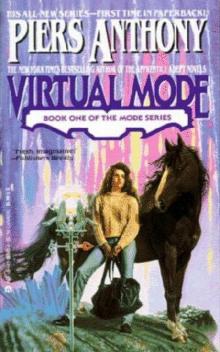 Virtual Mode
Virtual Mode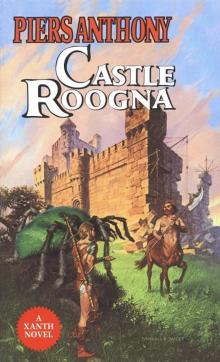 Castle Roogna
Castle Roogna Aliena Too
Aliena Too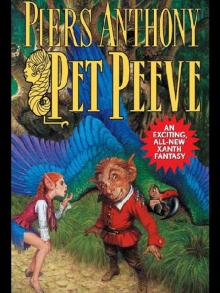 Pet Peeve
Pet Peeve The Metal Maiden Collection
The Metal Maiden Collection Volk
Volk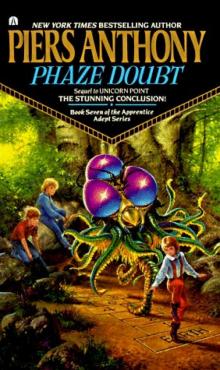 Phaze Doubt
Phaze Doubt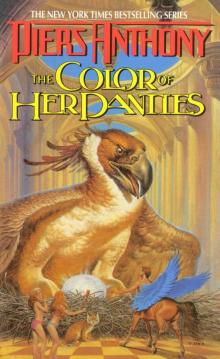 The Color of Her Panties
The Color of Her Panties Amazon Slaughter and Curse of the Ninja Piers Anthony
Amazon Slaughter and Curse of the Ninja Piers Anthony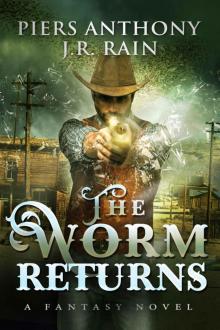 The Worm Returns
The Worm Returns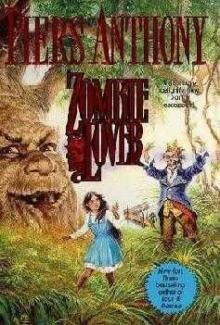 Zombie Lover
Zombie Lover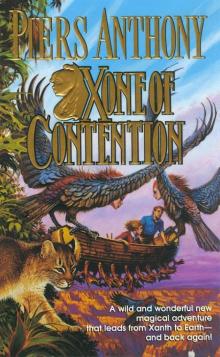 Xone of Contention
Xone of Contention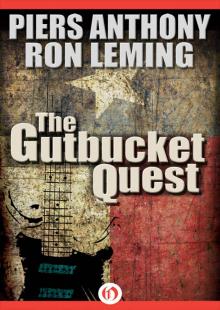 The Gutbucket Quest
The Gutbucket Quest Split Infinity
Split Infinity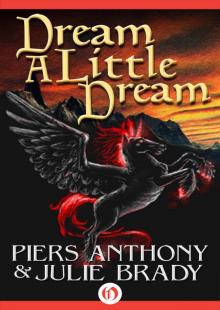 Dream a Little Dream: A Tale of Myth and Moonshine
Dream a Little Dream: A Tale of Myth and Moonshine Balook
Balook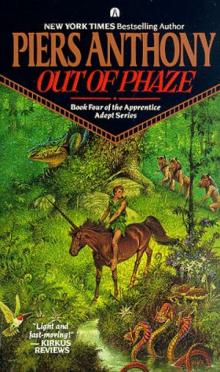 Out of Phaze
Out of Phaze The Secret of Spring
The Secret of Spring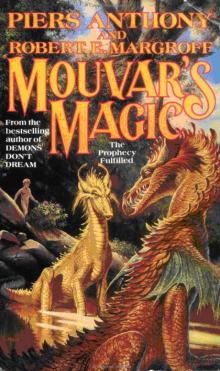 Mouvar's Magic
Mouvar's Magic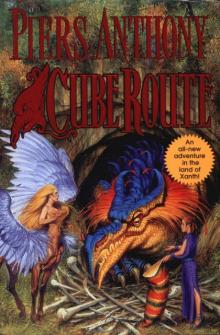 Cube Route
Cube Route Mercenary
Mercenary Total Recall
Total Recall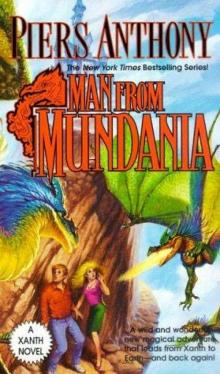 Man From Mundania
Man From Mundania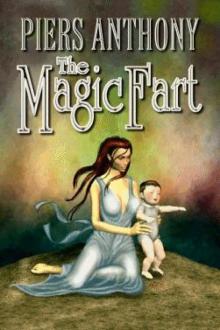 The Magic Fart
The Magic Fart Letters to Jenny
Letters to Jenny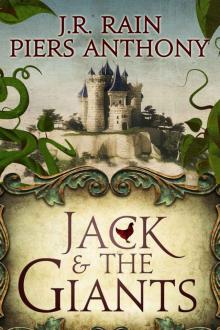 Jack and the Giants
Jack and the Giants Executive
Executive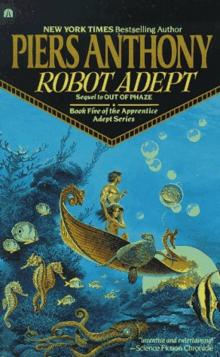 Robot Adept
Robot Adept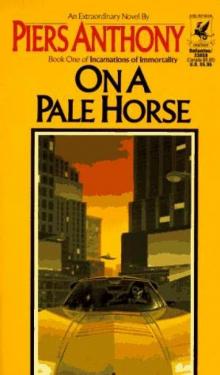 On A Pale Horse
On A Pale Horse Vale of the Vole
Vale of the Vole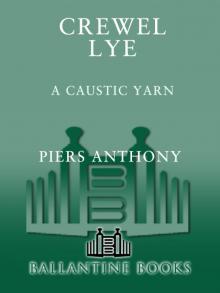 Crewel Lye
Crewel Lye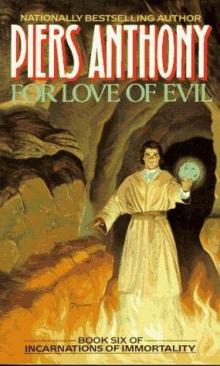 For Love of Evil
For Love of Evil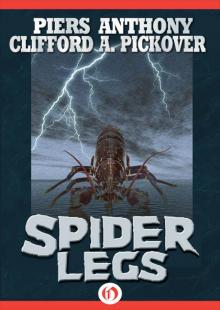 Spider Legs
Spider Legs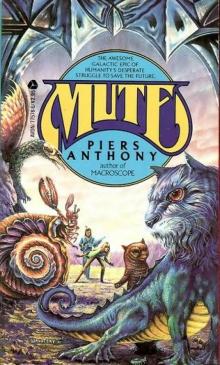 Mute
Mute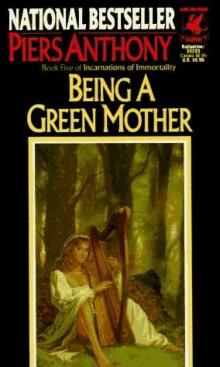 Being a Green Mother
Being a Green Mother Hair Suite
Hair Suite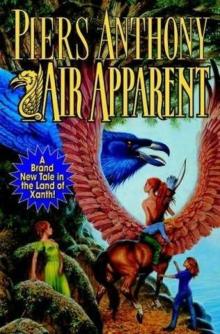 Air Apparent
Air Apparent Politician
Politician Aliena
Aliena Phthor
Phthor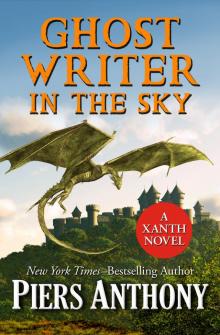 Ghost Writer in the Sky
Ghost Writer in the Sky Pornucopia
Pornucopia Eroma
Eroma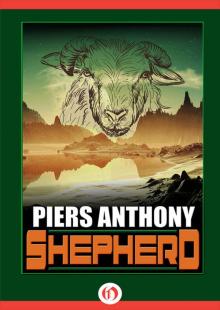 Shepherd
Shepherd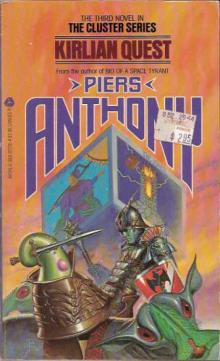 Kirlian Quest
Kirlian Quest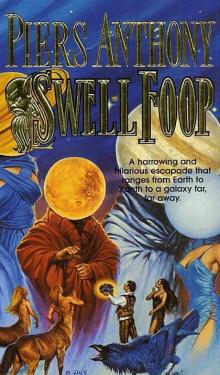 Swell Foop
Swell Foop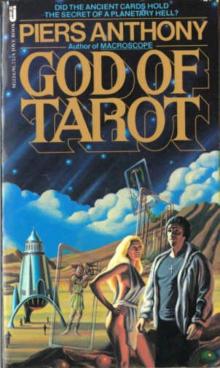 God of Tarot
God of Tarot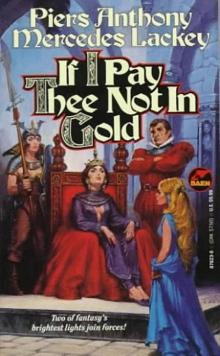 If I Pay Thee Not in Gold
If I Pay Thee Not in Gold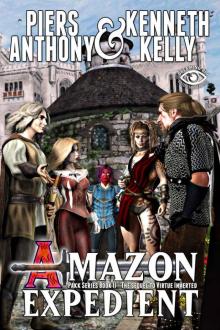 Amazon Expedient
Amazon Expedient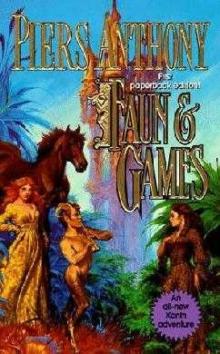 Faun & Games
Faun & Games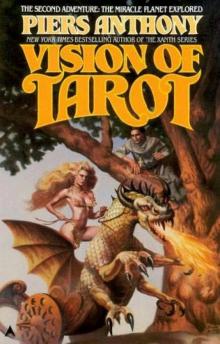 Vision of Tarot
Vision of Tarot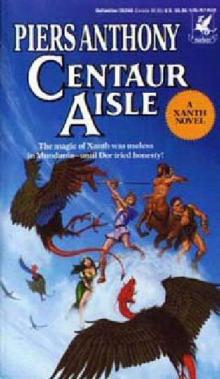 Centaur Aisle
Centaur Aisle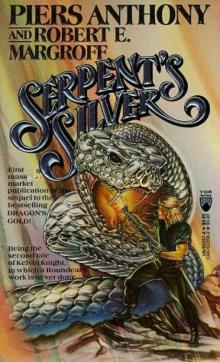 Serpent's Silver
Serpent's Silver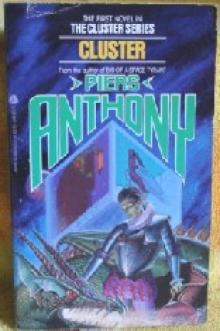 Cluster
Cluster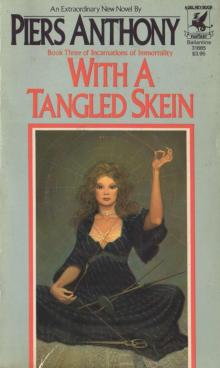 With a Tangled Skein
With a Tangled Skein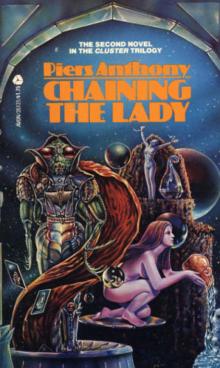 Chaining the Lady
Chaining the Lady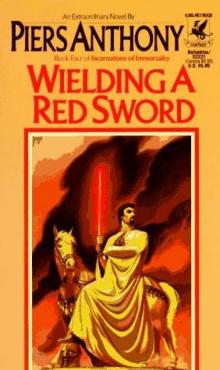 Wielding a Red Sword
Wielding a Red Sword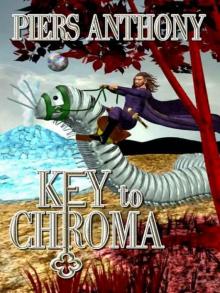 Key to Chroma
Key to Chroma WereWoman
WereWoman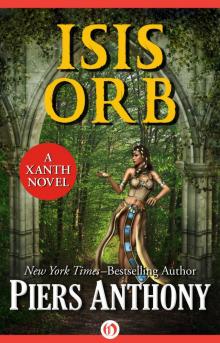 Isis Orb
Isis Orb Hair Peace
Hair Peace Two to the Fifth
Two to the Fifth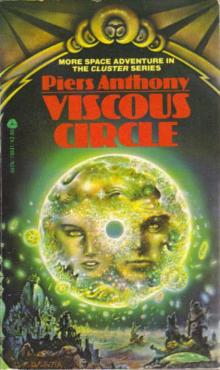 Viscous Circle
Viscous Circle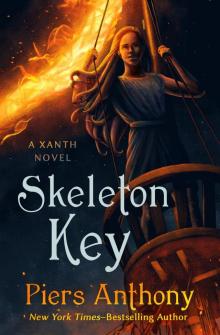 Skeleton Key
Skeleton Key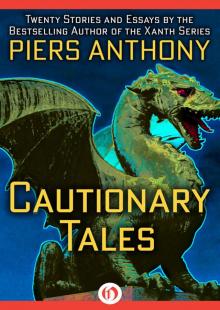 Cautionary Tales
Cautionary Tales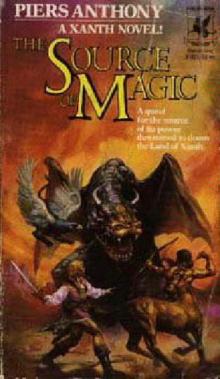 The Source of Magic
The Source of Magic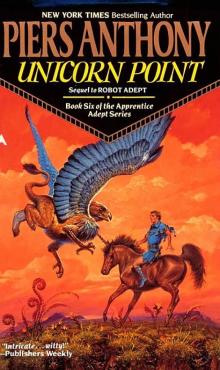 Unicorn Point
Unicorn Point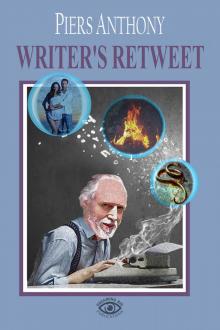 Writer's Retweet
Writer's Retweet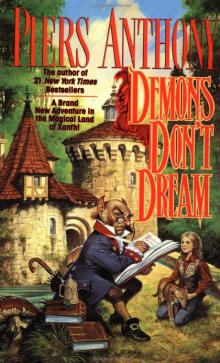 Demons Don't Dream
Demons Don't Dream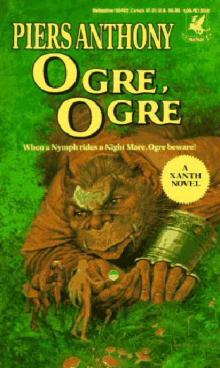 Ogre, Ogre
Ogre, Ogre The Iron Maiden
The Iron Maiden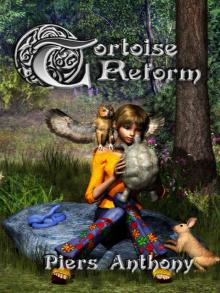 Tortoise Reform
Tortoise Reform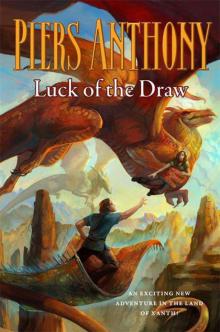 Luck of the Draw
Luck of the Draw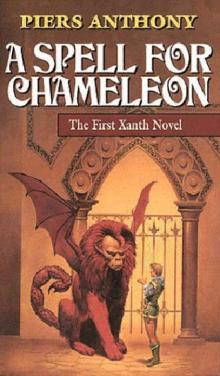 A Spell for Chameleon
A Spell for Chameleon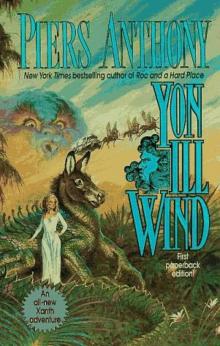 Yon Ill Wind
Yon Ill Wind Currant Events
Currant Events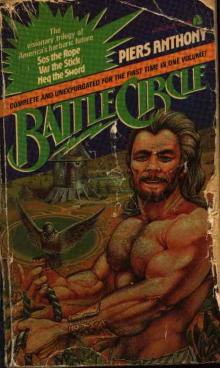 Var the Stick
Var the Stick And Eternity
And Eternity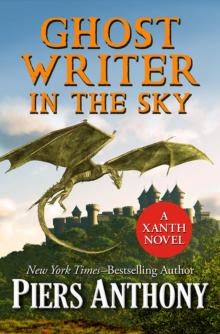 Kiai! & Mistress of Death
Kiai! & Mistress of Death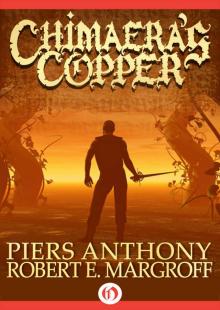 Chimaera's Copper
Chimaera's Copper Refugee
Refugee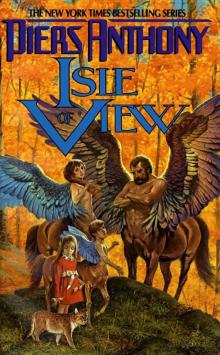 Isle of View
Isle of View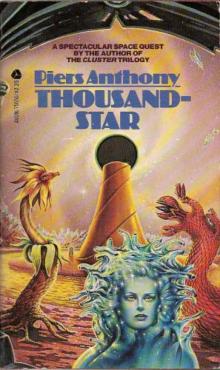 Thousandstar
Thousandstar Mer-Cycle
Mer-Cycle Service Goat
Service Goat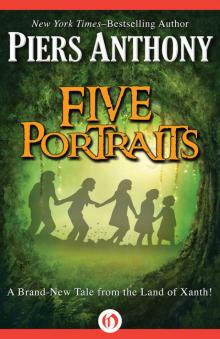 Five Portraits
Five Portraits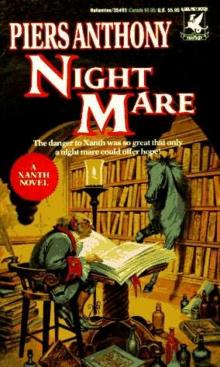 Night Mare
Night Mare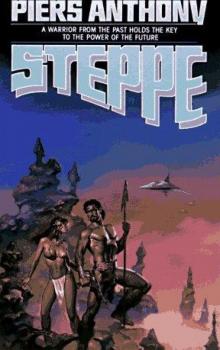 Steppe
Steppe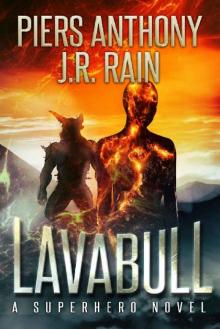 Lavabull
Lavabull Well-Tempered Clavicle
Well-Tempered Clavicle Aladdin Relighted
Aladdin Relighted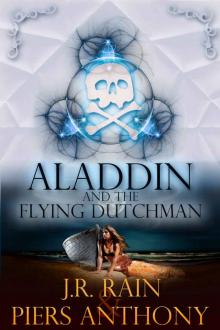 Aladdin and the Flying Dutchman
Aladdin and the Flying Dutchman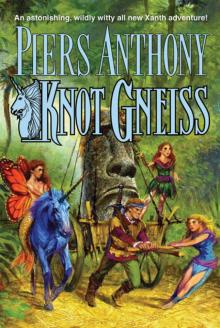 Knot Gneiss
Knot Gneiss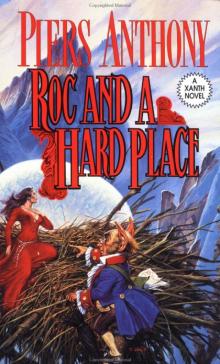 Roc and a Hard Place
Roc and a Hard Place Aladdin Sins Bad
Aladdin Sins Bad Flytrap
Flytrap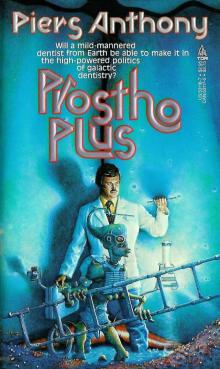 Prostho Plus
Prostho Plus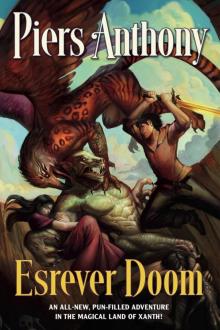 Esrever Doom
Esrever Doom Hair Power
Hair Power The Journey
The Journey Virtue Inverted
Virtue Inverted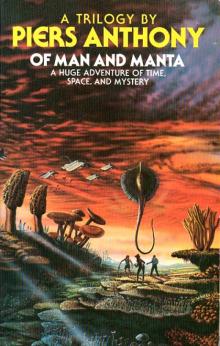 Of Man and Manta Omnibus
Of Man and Manta Omnibus Trail Mix: Amoeba
Trail Mix: Amoeba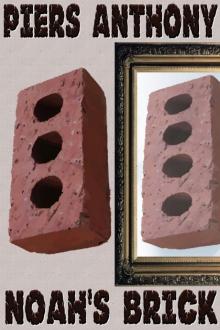 Noah's Brick
Noah's Brick Odd Exam
Odd Exam Magenta Salvation
Magenta Salvation Jest Right
Jest Right Fire Sail
Fire Sail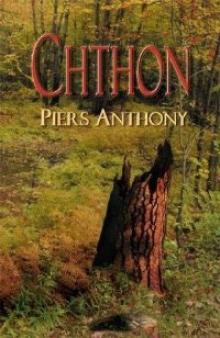 Chthon a-1
Chthon a-1 Amoeba
Amoeba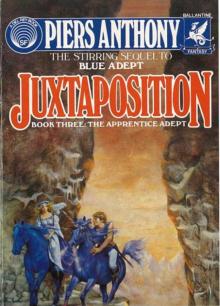 Juxtaposition aa-3
Juxtaposition aa-3 Pira
Pira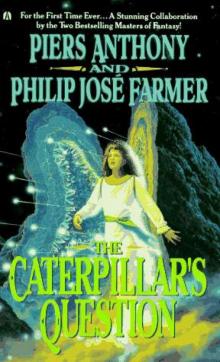 THE CATERPILLARS QUESTION
THE CATERPILLARS QUESTION What Fears Become: An Anthology from The Horror Zine
What Fears Become: An Anthology from The Horror Zine Bio of a Space Tyrant Vol. 3. Politician
Bio of a Space Tyrant Vol. 3. Politician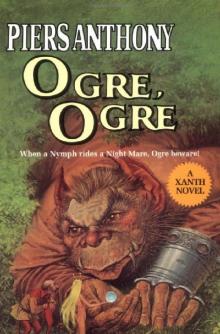 Ogre Ogre x-5
Ogre Ogre x-5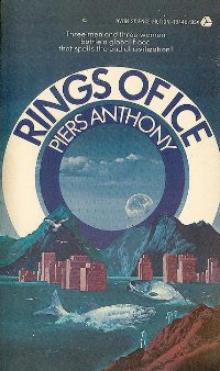 Rings of Ice
Rings of Ice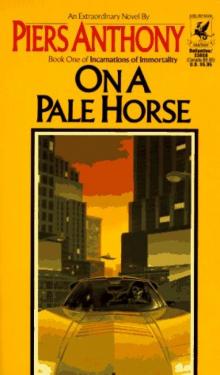 On a Pale Horse ioi-1
On a Pale Horse ioi-1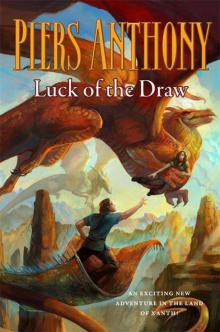 Luck of the Draw (Xanth)
Luck of the Draw (Xanth)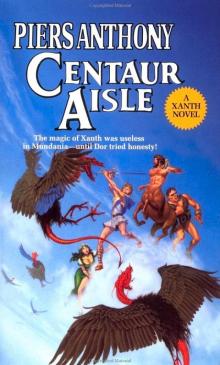 Centaur Aisle x-4
Centaur Aisle x-4 Thousandstar (#4 of the Cluster series)
Thousandstar (#4 of the Cluster series)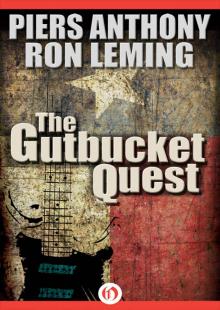 Gutbucket Quest
Gutbucket Quest Isle of Woman (Geodyssey)
Isle of Woman (Geodyssey)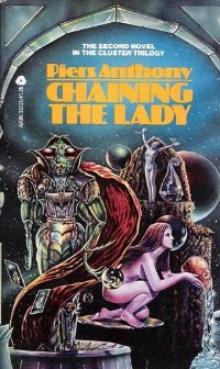 Chaining the Lady c-2
Chaining the Lady c-2 To Be a Woman
To Be a Woman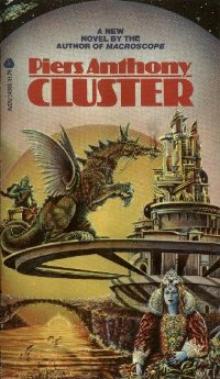 Cluster c-1
Cluster c-1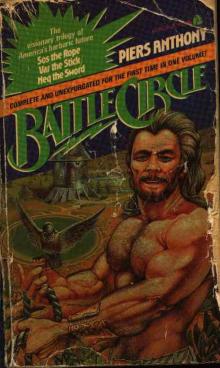 Battle Circle 2 - Var the Stick
Battle Circle 2 - Var the Stick Mercenary (Bio of a Space Tyrant Book 2)
Mercenary (Bio of a Space Tyrant Book 2)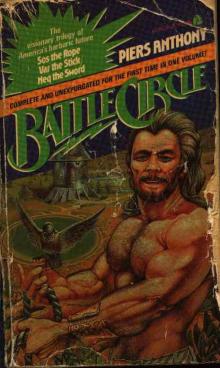 Battle Circle 1 - Sos the Rope
Battle Circle 1 - Sos the Rope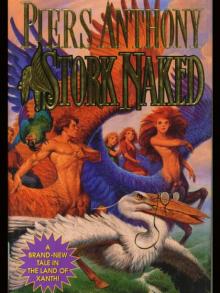 Xanth 30 - Stork Naked
Xanth 30 - Stork Naked Secret of Spring
Secret of Spring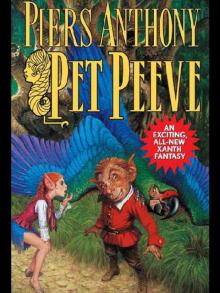 Xanth 29 - Pet Peeve
Xanth 29 - Pet Peeve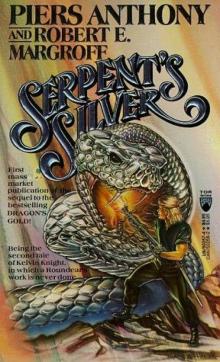 Serpents's Silver
Serpents's Silver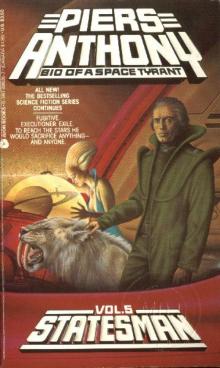 Statesman by Piers Anthony
Statesman by Piers Anthony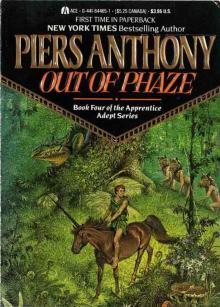 Out of Phaze aa-4
Out of Phaze aa-4 Amazon Slaughter & Curse of the Ninja
Amazon Slaughter & Curse of the Ninja